
 |
|
Proof (2005) Cast: Gwyneth Paltrow, Jake Gyllenhaal, Hope Davis, Anthony Hopkins, Gary Houston 2005 – 100 minutes Rated: Reviewed by Dustin Putman, September 14, 2005. 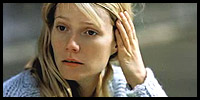 Based on a play by David Auburn that ran in London in 2002, the big-screen adaptation of "Proof," never quite overcomes its stage roots, but is fascinating all the same. Directed by John Madden (2001's "Captain Corelli's Mandolin") and co-written by Rebecca Miller (2002's "Personal Velocity"), the film's greatest strength is its superb acting, led by a crowning performance from Gwyneth Paltrow (2004's "Sky Captain and the World of Tomorrow"), who reprises her role from the London production.
Based on a play by David Auburn that ran in London in 2002, the big-screen adaptation of "Proof," never quite overcomes its stage roots, but is fascinating all the same. Directed by John Madden (2001's "Captain Corelli's Mandolin") and co-written by Rebecca Miller (2002's "Personal Velocity"), the film's greatest strength is its superb acting, led by a crowning performance from Gwyneth Paltrow (2004's "Sky Captain and the World of Tomorrow"), who reprises her role from the London production.
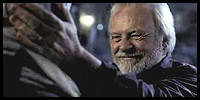 Paltrow stars as 27-year-old Catherine, an aspiring mathematician who has put her college career on hold for several years to take care of her mentally unstable father, Robert (Anthony Hopkins). As the picture opens, Robert, a once-brilliant mathematician himself, has just died of an aneurysm, leaving Catherine to pick up the pieces of her fractured life. Her overbearing older sister, Claire (Hope Davis), swoops in from New York City for the funeral and immediately begins feeling around for any signs that Catherine has inherited more from their father than just a talent in equations. When a notebook holding the possible answers to a heretofore unsolved theorem is found in Robert's desk drawer by eager former student Hal (Jake Gyllenhaal)—and Catherine claims credit for its contents—she is immediately called into question for whether she is telling the truth, or could have even been capable of writing it. Is Catherine the actual author of such a groundbreaking find, and if not, could it even be possible that the insane Robert would have been able to formulate it?
Paltrow stars as 27-year-old Catherine, an aspiring mathematician who has put her college career on hold for several years to take care of her mentally unstable father, Robert (Anthony Hopkins). As the picture opens, Robert, a once-brilliant mathematician himself, has just died of an aneurysm, leaving Catherine to pick up the pieces of her fractured life. Her overbearing older sister, Claire (Hope Davis), swoops in from New York City for the funeral and immediately begins feeling around for any signs that Catherine has inherited more from their father than just a talent in equations. When a notebook holding the possible answers to a heretofore unsolved theorem is found in Robert's desk drawer by eager former student Hal (Jake Gyllenhaal)—and Catherine claims credit for its contents—she is immediately called into question for whether she is telling the truth, or could have even been capable of writing it. Is Catherine the actual author of such a groundbreaking find, and if not, could it even be possible that the insane Robert would have been able to formulate it?
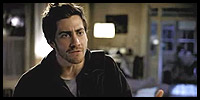 "Proof," a small-scale, virtually four-character drama, is difficult to summarize because the film relies much more on interior feelings and human behavior than it does on conventional plot developments. There are some surprises along the way of a subjective and structural nature—i.e., the ultimate truth concerning the mathematical proof, the ingeniously edited segues between the past and present—but the film garners the majority of its interest from the hurdles that Catherine faces. Filled with fear to move forward and take chances in her life and potential career, all the while haunted by the possibility that her father's devastating illness may run in the family, Catherine is left emotionally stunted in the wake of her father's death. Having known nothing else but to live for him, she is suddenly left with the daunting task of standing alone and concentrating on herself. With her childhood home abruptly being taken away from her by the university and Claire insisting that she move with her to Manhattan, Catherine is at a veritable crossroads that she's unsure she wants to step across.
"Proof," a small-scale, virtually four-character drama, is difficult to summarize because the film relies much more on interior feelings and human behavior than it does on conventional plot developments. There are some surprises along the way of a subjective and structural nature—i.e., the ultimate truth concerning the mathematical proof, the ingeniously edited segues between the past and present—but the film garners the majority of its interest from the hurdles that Catherine faces. Filled with fear to move forward and take chances in her life and potential career, all the while haunted by the possibility that her father's devastating illness may run in the family, Catherine is left emotionally stunted in the wake of her father's death. Having known nothing else but to live for him, she is suddenly left with the daunting task of standing alone and concentrating on herself. With her childhood home abruptly being taken away from her by the university and Claire insisting that she move with her to Manhattan, Catherine is at a veritable crossroads that she's unsure she wants to step across.
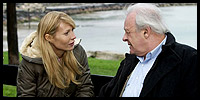 Gwyneth Paltrow's textural, exquisitely modulated turn as Catherine is the much-needed centerpiece of every scene. Having played the part before, she knows the person she is portraying through and through, and it shows. Paltrow is, at once, understated and rattlingly powerful, her facial expressions and body language riveting even when she is simply biting her fingernails or sitting silently by herself. Catherine is more of an introspective character than an outgoing one—she has no friends or social life, and when she and Hal find themselves kissing on her bed, she recoils twice because of this close newfound connection she is unfamiliar with—but that makes what Paltrow does all the more brilliant. She's a joy to watch. The other three central performers—Hope Davis (2001's "Hearts in Atlantis") as judgmental sister Claire, Jake Gyllenhaal (2004's "The Day After Tomorrow") as possible boyfriend Hal, and Anthony Hopkins, miles away from "Hannibal" as unhinged father Robert—lend unblemished support.
Gwyneth Paltrow's textural, exquisitely modulated turn as Catherine is the much-needed centerpiece of every scene. Having played the part before, she knows the person she is portraying through and through, and it shows. Paltrow is, at once, understated and rattlingly powerful, her facial expressions and body language riveting even when she is simply biting her fingernails or sitting silently by herself. Catherine is more of an introspective character than an outgoing one—she has no friends or social life, and when she and Hal find themselves kissing on her bed, she recoils twice because of this close newfound connection she is unfamiliar with—but that makes what Paltrow does all the more brilliant. She's a joy to watch. The other three central performers—Hope Davis (2001's "Hearts in Atlantis") as judgmental sister Claire, Jake Gyllenhaal (2004's "The Day After Tomorrow") as possible boyfriend Hal, and Anthony Hopkins, miles away from "Hannibal" as unhinged father Robert—lend unblemished support.
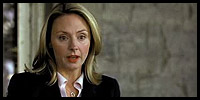 If "Proof" is top-notch as a thespian's showcase and holds the viewer's interest fairly consistently, it is debatable whether the film as a whole is up to that same high level. Director John Madden does what he can by opening up the setting with luscious exterior Chicago locations, but isn't exactly successful at disguising that it was made as a play. Filled with dialogue-heavy sequences and at least two heated confrontations/yelling matches too many, the movie occasionally falls into the trap of feeling overly stagy. And for a motion picture stemming from characters' passion for math, precious little on the subject is ever seen or discussed. It would have been beneficial, for example, to understand why Catherine loves it so much, outside of the obvious that her father was a mathematician.
If "Proof" is top-notch as a thespian's showcase and holds the viewer's interest fairly consistently, it is debatable whether the film as a whole is up to that same high level. Director John Madden does what he can by opening up the setting with luscious exterior Chicago locations, but isn't exactly successful at disguising that it was made as a play. Filled with dialogue-heavy sequences and at least two heated confrontations/yelling matches too many, the movie occasionally falls into the trap of feeling overly stagy. And for a motion picture stemming from characters' passion for math, precious little on the subject is ever seen or discussed. It would have been beneficial, for example, to understand why Catherine loves it so much, outside of the obvious that her father was a mathematician.
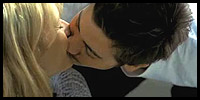 When one steps away from "Proof," however, math is merely a plot device (one that could have been replaced by just about any profession or hobby) used to explore the real story, which is that of a young woman's journey toward coming to terms with her familial history and gaining the strength to move forward in a world open with possibilities. Even amidst the moments of mannered repetition, and aided immeasurably by Gwyneth Paltrow's ace performance, it is the poignantly-felt human drama and delicate relationships within "Proof" that make the film a worthwhile experience.
When one steps away from "Proof," however, math is merely a plot device (one that could have been replaced by just about any profession or hobby) used to explore the real story, which is that of a young woman's journey toward coming to terms with her familial history and gaining the strength to move forward in a world open with possibilities. Even amidst the moments of mannered repetition, and aided immeasurably by Gwyneth Paltrow's ace performance, it is the poignantly-felt human drama and delicate relationships within "Proof" that make the film a worthwhile experience.
|
© 2008 by Dustin Putman |














